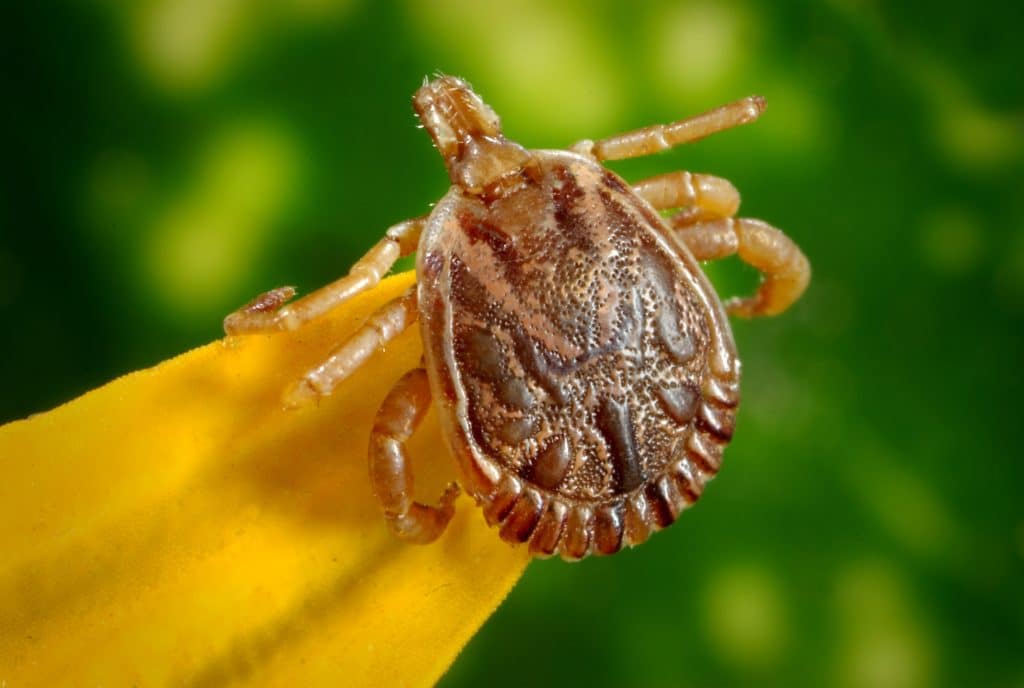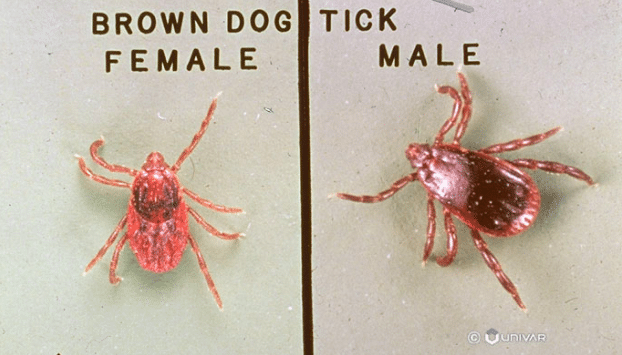Are there ticks in Hawaii? Well yes, but maybe not the ones you’re thinking of. According to the state of Hawaii deer ticks have not been located on the islands but they do have ticks!
There might not be a cure for Lyme disease but scientists are working on a vaccine. Knowing how to identify ticks that could pass Lyme disease is an important step in prevention.
Ticks in Hawaii
While there are ticks in Hawaii, according to the Vector Control Branch of the Hawaii Department of Health, the species responsible for transmitting Lyme disease, Ixodes scapularis or Deer Tick, does not inhabit the island. There are however other species of ticks in Hawaii.
Species of Ticks in Hawaii
The prevalent species on the island are the Brown Dog Tick, Rhipicephalus sanguineus Latreille (Arachnida: Acari: Ixodidae) and the Spinose Ear Tick Otobius megnini. What needs to be acknowledged is that ticks carry many different diseases, not just Borrelia, the bacteria that causes Lyme disease.
Brown dog ticks are mostly known to carry and spread diseases affecting canines, but they have more recently been shown to carry and transmit at least one disease that impacts human health: Rocky Mountain Spotted Fever otherwise referred to as RMSF.
Rocky Mountain Spotted Fever
Rocky Mountain spotted fever is a serious tick borne illness which can be deadly if not treated early. Rocky Mountain spotted fever (RMSF) is a bacterial disease spread through the bite of an infected tick. Signs and symptoms of RMSF are fever, headache, and a rash. Antibiotic therapy for RMSF is usually administered for five to seven days, continuing for at least three days after the fever abates.
If an affected individual is treated with appropriate antibiotic therapy within the first three to five days of illness, the fever usually subsides within two to three days. This is one of the diseases that ticks in Hawaii can carry.
While yes, Hawaii does have a problem with ticks, Alaska’s tick problem is much worse making Hawaii the lesser of evil when it comes to states outside the continental United States.
Lyme Disease In Hawaii
While most Hawaiian Lyme patients have contracted the disease away from home. There are also military personnel who are getting infected all over the world and then being relocated to Hawaii. When they come back, they often don’t know what’s wrong with them, which means there’s a greater risk of misdiagnosis.
If you think you may have contracted Lyme Disease, another type of Tick Borne Disease or been bitten on the island there are lyme literate doctors in Hawaii.
Dr. Ty Vincent at Global Immunity uses Low-Dose Immunotherapy (LDI) to treat his patients. LDI is a treatment to help modulate the immune response in patients with Lyme, autoimmunity, PANS/PANDAS, chronic infections, and other inflammatory conditions.
Dr. Christopher Lawinski of Hawaii Whole Person Collective in Pahoa uses an Integrative approach. He also uses LDI in addition to ozone and other treatment modalities. Ozone therapy has been used for years to treat a wide range of conditions, and has gained recognition for its success in treating Lyme and Tick Borne Diseases.
Dr. Kristen Coles who practices at the Steelsmith Natural Health Center in Honolulu utilizes ozone therapy to support Lyme patients.
Dr. Allison Gandre Hawaii Natural Healing Center located in Kailua and Honolulu also uses an integrative approach of LDI and IV therapies.
Ticks In Hawaii: Dogs
Wherever you are in the world, the best method of fighting tick borne infections is prevention. Here are some recommendations to help lessen the chances of a bite for you, your pet and to keep ticks out of your Hawaiian home:
- Place your dogs on a year-round tick control product under the guidance of their veterinarian
- After spending time outside, check your pet for ticks before bringing them inside
- Wash pet bedding once a week
- Don’t let your four-legged friend go wandering the hiking trail out into tall grass or wooded areas
- Keep your lawn mowed
- Remove any dead leaves, palm frons, pine needles, or grass clippings from your yard
- If possible, keep your dogs off of furniture and beds
- Routinely vacuum the floors of your home to pick up any stray ticks
- When hiking, be careful for ticks in Hawaii. On the islands wear light-colored pants and long-sleeve shirts, shoes (no sandals) and a hat. If you have long hair, put it up in a ponytail. Tuck pant legs into socks or shoes, and tuck shirts into pants. Light-colored garments are better for locating ticks.
- When hiking, stay on trails
- Use an insect repellent. Make sure they are specific for ticks and have ingredients like Permethrin, Lemon Grass, Rose Geranium, human safe DEET, peppermint or Rosemary. Make sure to spray your shoes as well as your clothing.
- After you spend time outdoors, do a tick check. Look behind the ears, in the hair line, under folds of skin, in your armpits and behind the knees. Be aware that the nits (baby ticks) can be as small as the size of a poppy seed so be thorough. Then wash and dry clothing at high temperatures.
Catch a Tick in Hawaii? Here’s what to do
If you do find a tick attached, don’t panic! There’s nothing special to removing a tick in Hawaii. To remove a tick, use fine-tipped tweezers. Grab the tick as close to your skin as possible. Pull in a gentle yet steady upward motion until the tick comes out. Place the tick in a zip lock bag with a damp cotton ball. There are many labs throughout the mainland that can test the tick for diseases beyond Borrelia. Here is a list of a few:
- www.ticknology.org – located in Ft. Collins, Colorado. Cost for the test ranges from $35 – $55 depending on the level of expediting you prefer.
- www.tickcheck.com – located in East Stroudsburg, Pennsylvania. For non-Pennsylvania residents the cost for the test ranges from $49.99 – $99.99 depending on the amount of pathogens you want tested.
- www.tickreport.com – located in Amherst, Massachusetts. This lab has three packages to choose from with regards to testing. Package one is $50, package 2 is $100 and package 3 is $200.








